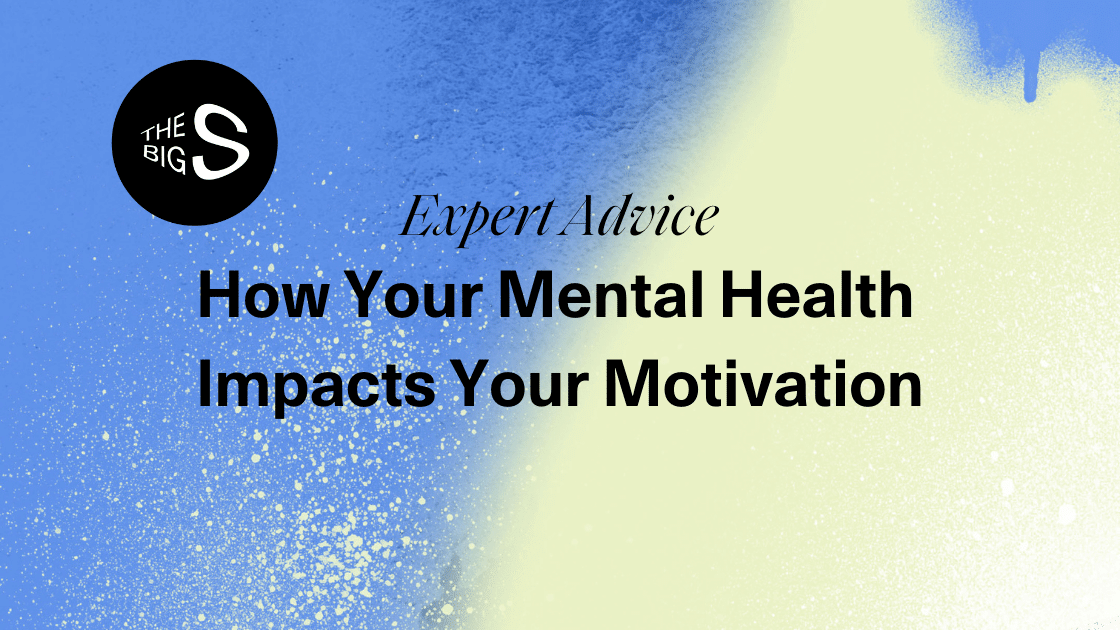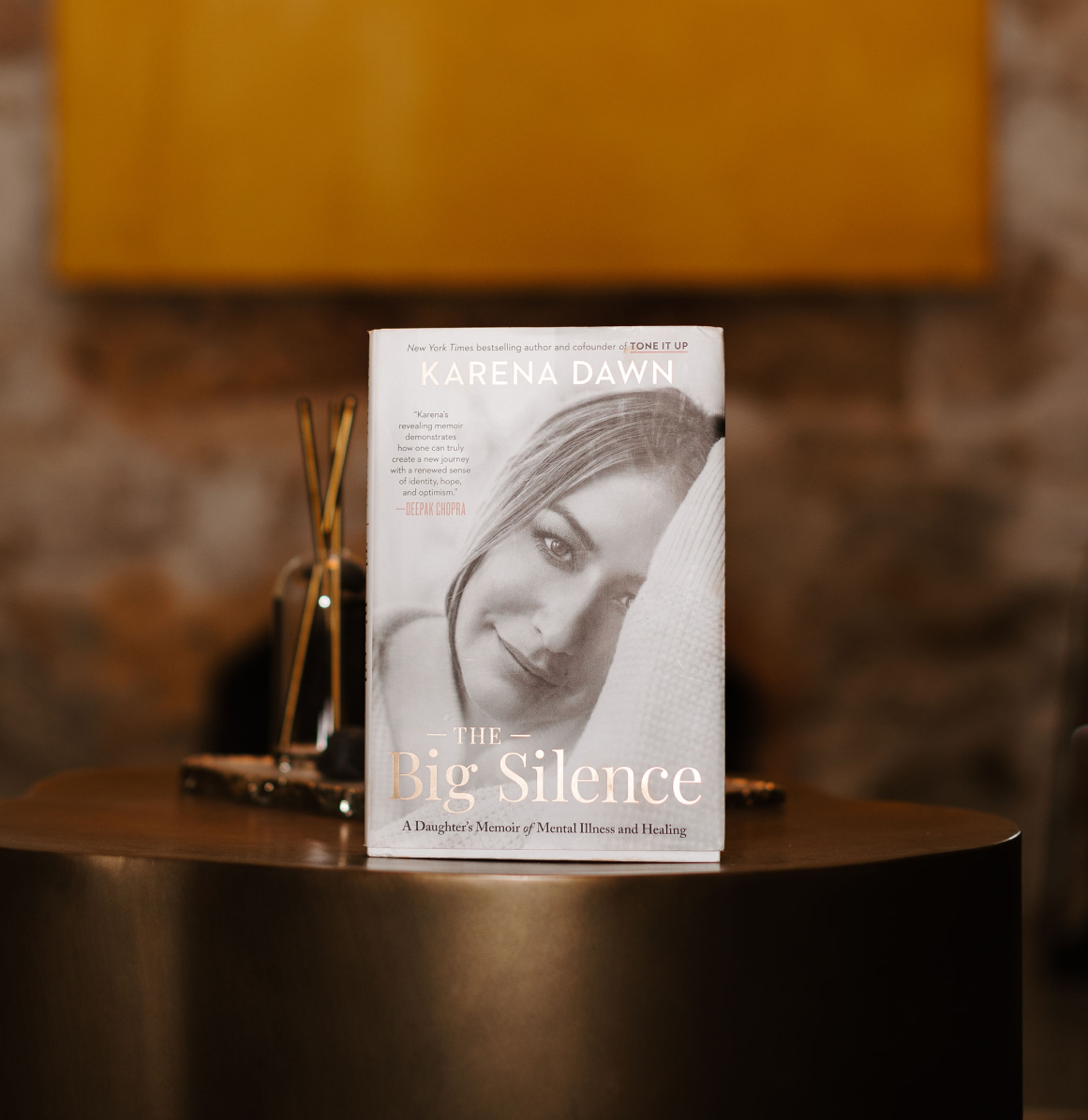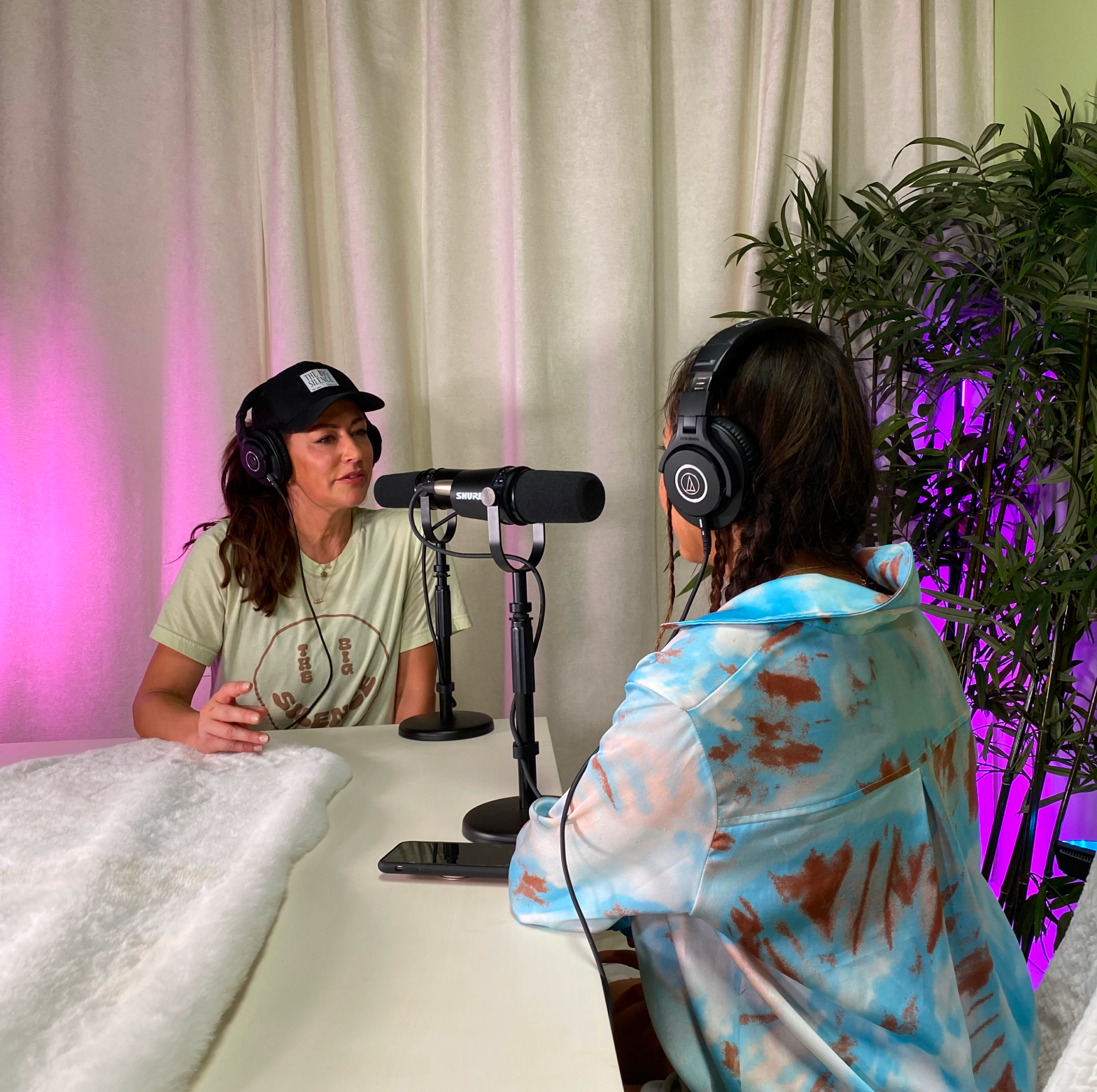How Does Your Mental Health Impact Your Motivation?
Talking to this community and our own loved ones, we’ve been hearing the same thing over and over lately — “I’m not nearly as motivated as I used to be.” “I’ve lost my drive and I don’t know why.” “My usual passion and spark feel a little dimmer.”
Sound familiar? If so, you’re not alone. This ‘blah’ feeling has been so prevalent in the last two years that author and psychology professor Adam Grant put a name to it in a widely shared New York Times article: languishing. Grant writes, “Languishing is the neglected middle child of mental health. It’s the void between depression and flourishing — the absence of well-being.”
Collectively, we’re starting to talk about the link between motivation and mental health. And yet, there is still a dangerous misconception that if you’re feeling unmotivated, you are somehow lazy or unworthy. As always, our mission at The Big Silence is to break the stigmas that keep us struggling in silence. So we talked to experts about the ways mental health impacts motivation — and gentle ways to reignite your drive and feel like your best self again.
The Motivation/Mental Health Connection
“Motivation is what energizes and inspires us, and mental health affects that in every way,” says licensed clinical social worker Jenna Stark, MSSW, LCSW, LICSW. “If someone is in an emotional state of distress — whether that be anxiety, depression, grief, or trauma — motivation is going to be directly impacted. If we’re in a state of fight or flight, or survival mode, being energized and inspired isn’t going to be possible.”
Some of the most common mental health conditions that can trigger difficulty with motivation include depression, anxiety, and ADHD. “Depression symptoms include low motivation, fatigue, difficulty concentrating, increases or decreases in sleep, and low self-esteem,” says clinical social worker Morgan Winder, LMSW. With anxiety, physical symptoms such as rapid heart rate, shakiness, and upset stomach can make it difficult to keep focus and stay on task, which affects drive, according to Winder. “ADHD can also make it difficult to initiate and tackle tasks as well as maintain motivation once you are working,” she adds.
Even without these conditions, our own minds can talk us out of feeling motivated. “Our brains are powerful in convincing us that we need to do everything perfectly and if we don’t, we’re not good enough,” says licensed clinical psychologist Dr. Krista DiVittore, PsyD. “That’s a contributor to feeling stuck.” In other words, if I can’t do this perfectly, why should I even start in the first place?
Outside stressors can also force us into a rut. Circumstances like physical illness, burnout at work, stress at school, family issues, recent life changes, and of course collective stressors like a global pandemic can all lead to emotional exhaustion, which is a large contributing factor to low motivation, according to Winder. This all connects to the fight or flight response — if you’re fighting to survive, how can you be expected to thrive?
When to Seek Support
There is a natural ebb and flow of motivation and mood, so how do you know when it’s time to seek professional help? All of the experts agree that you don’t need a specific reason to start talking to a therapist — it is always a “good” time. (Read more about destigmatizing and demystifying therapy here.)
However, there are markers to signal if your dip in motivation may be situational and temporary or more generally depleting. “Think about when the dip in motivation occurred as well as any recent changes associated with the timeline of low motivation,” suggests Winder. “For example, if I have been feeling low motivation for a week, I might ask myself, ‘Have there been any job or personal changes? Have I changed anything in my routine? Are there any hormonal or external factors with my health? If you feel your low motivation has been for a long duration and it is difficult to assess the trigger, I recommend seeing a therapist to assist you with this.”
You should also assess how your motivation level is impacting your daily activities. “If your thoughts are getting in the way of doing things in multiple areas of your life — at work, with your friends and family, what you do for fun — that could be a sign to get support from a mental health professional,” says Dr. DiVittore. “They will provide strategies to help you get out of being stuck.”**
How To Reclaim Your Spark
So what are those strategies? The experts share 7 tangible steps you can start taking to gently boost your motivation and rediscover your drive.
Start small
We talked earlier about how it’s easy to get overwhelmed by perfectionism, so you feel less motivated to start toward a project or goal. One way to combat this: Take it one step at a time.
“Set small, specific goals to make it less overwhelming,” suggests Stark. “Really break it down. If you’re having trouble getting up in the morning, let’s just focus on putting your feet on the ground and taking the next step. If you’re feeling disconnected, make a plan to call or text two friends this week. It’s about piecing together those small wins.”
Dr. DiVittore agrees that nothing is too small and every action counts. “We are thinking about getting that engine started so you can find achievement in something,” she says. “Then give yourself credit for what you’ve done. A lot of people, especially women, have a hard time giving themselves credit. Self acknowledgement builds self efficacy, which builds the motivation to keep going.”
Look inside for fulfillment
A lot of people are motivated by extrinsic rewards that come from outside of ourselves — think: getting a promotion, good grades, sharing on social media, validation from others. Dr. DiVittore emphasizes placing more value on intrinsic rewards that fulfill us, even if we don’t have something to show for it.
“That’s what lights up the reward system inside our brain,” she says. She notes that this triggers the release of feel-good neurochemicals like dopamine and serotonin. Intrinsic joys are different for everyone, but some examples include volunteering, connecting socially, finding personal enjoyment in your work, listening to music, dancing, or anything else that lights you up.

Recruit accountability buddies
It’s often easier to feel motivated with a friend by your side. “This also gives you built-in accountability,” Stark says. “You can share your goals and wins with a loved one. If a friend is feeling unmotivated too, suggest meeting up for a walk and coffee every Sunday.”
Adds Dr. DiVittore, “Being with your people is so important for your mood and motivation. It gives you that supportive sense of ‘I can do this and I know my people support me.’”
Practice mindfulness
Our anxious minds get ahead of ourselves fixating on the future or behind us dwelling in the past, and it’s tough to feel motivated in the present when your mind is elsewhere. When you are feeling stuck or apathetic, “take a few moments to be in the present, whether that’s through breathing, meditation, yoga, or journaling,” says Dr. DiVittore. “Grounding in the present will put you in a position to take actions that will help you feel better and more like yourself.”
Make time for self-care
Emotional exhaustion and a decrease in drive are often caused by a lack of self-care, notes Winder. “Listen to your body,” she says. “If you need rest and self-care, listen to those cues and implement healthy activities to refuel your body.” This can look like exercise, time in nature, meditation, a soothing bath, or whatever self-care means to you.
Prioritize play
Adulting doesn’t have to be draining. “As we get older, there’s an expectation that we are going to produce and that’s how we measure worth,” says Stark. “As human beings, we also need to make time for joy that isn’t productive.” Ask yourself: What brought me joy when I was young? How can I make life more playful now? Can I do things for fun with no end result in mind?
“If you like to draw or doodle, why not get a coloring book? How about taking an improv class, having a game night, or putting on your old favorite Disney movie?” she suggests. “Do it for the journey; not the destination.”
Go easy on yourself
All of our experts noted that there’s a pervasive pressure in our society to constantly be on the go, to be productive, to be doing something. This can cause a shame response when you’re feeling less motivated, but remember this: your worth is not tied to your motivation or productivity. You are inherently worthy.
Stark reminds us of the quote, “We are human beings, not human doings.”
Winder also shares these mantras with her clients — and uses them herself — as gentle reminders:
“Your worth has nothing to do with the state of your to-do list. It has nothing to do with how much you get done.”
“Let’s let go of ‘busy’ as a status symbol and our productivity as self-worth”
You deserve to feel driven, motivated, and passionate, but you do not always need to be ‘on.’ Ultimately, letting go of this expectation and giving yourself grace may be just what you need to reignite your spark.
“Let’s slow down and give ourselves permission to do things we enjoy,” says Dr. DiVittore. “Usually that will help our motivation level if we take those moments to let our brain breathe and rejuvenate.”
Want to learn more about these experts?
You can find Dr. Krista DiVittore’s Instagram here. She is the co-author of 5 Things You Need to Know About Social Skills Coaching and works at a group practice in Denver, Colorado.
You can find Jenna Stark’s website here and her Instagram here. She is a licensed clinical social worker in California and Massachusetts.
You can find Morgan Winder’s website here and her Instagram here. She works in private practice in Phoenix, Arizona, and she is currently the chair for a service committee organizing community events to help individuals access mental healthcare.
The information provided by Dr. Krista DiVittore, Jenna Stark, and Morgan Winder is for educational purposes only, and does not substitute for professional medical advice. Advise users to consult a medical professional or healthcare provider if they're seeking medical advice, diagnoses, or treatment.
**Please note that if your thoughts start becoming hopeless or suicidal, contact emergency and crisis services immediately. You can find more resources here.
Shop the Smiley Collection to Start a Conversation
Motivation and Mental Health on The Big Silence Podcast
The Big Silence Podcast is talking about motivation and mental health. For your next step, check out one of these episodes:
SECRETS OF A TOP TRAINER: FITNESS MOTIVATION & FINDING INNER STRENGTH WITH ERIC RAKOFSKY Eric opens up about his childhood in Brooklyn and how he processed grief following his father’s death. We talk about how to shift out of a victim mentality, and get Eric’s valuable advice to stay present through life’s challenges. Plus, tune in for his tips on how to get started on a fitness journey, ways to find motivation after a break from exercise, and the secrets to being a leading personal trainer.
HOW TO BUILD UNBREAKABLE CONFIDENCE & RESILIENCE WITH DEMI-LEIGH TEBOW Demi opens up about the carjacking experience and how she trusted her intuition to fight back. We explore her healing journey through trauma counseling and EMDR therapy. We also talk about ways to tackle our everyday lives with confidence, how a small act can make a big impact, and Demi’s #1 practice for her mental health. Plus, she shares a genius tip for holding yourself accountable and staying motivated in your workout routine.
ARE YOU LIVING LIKE YOU MEAN IT? AND MORE BIG QUESTIONS WITH AUTHOR & CANCER THRIVER KRIS CARR As a New York Times bestselling author, wellness activist, and cancer thriver, Kris leads the charge in the fight against disease, empowering people to take back their physical and mental health. You’ll hear examples of her own strength throughout the conversation; we can all learn from how she lives with perseverance, positivity, and presence.
RESILIENCE AS A SUPERPOWER: TONE IT UP GIRL KATRINA SURDI’S STORY OF LOSS, LOVE & COMMUNITY In this vulnerable conversation, Katrina talks about her experiences losing family members and friends, tips for resilience, and advice for helping others navigate grief. We also explore how she nurtures her own physical and mental health through exercise, yoga, meditation, and the power of community. Katrina shares how she prioritizes self-care, even as she is a caretaker to her students and family.
UNMASKING RESILIENCE: FROM MESSY MINDS TO MENTAL MASTERY WITH DR. CAROLINE LEAF For over four decades, Dr. Leaf has been at the forefront of mind-brain research, tirelessly exploring the profound ways our minds shape our brains, control our thoughts, and ultimately define our mental well-being.
SASHA PIETERSE ON KNOWING YOUR VALUE, REJECTION RESILIENCE, PCOS & MOTHERHOOD A passionate actress, author, and entrepreneur, she’s been an actress for 22 years with the privilege of working on some fantastic television shows and films, including the hit series Pretty Little Liars. We touch on all the juicy stuff in this one… Growing up in Hollywood and her experience as a child actor, how to speak your mind and #notbeanasshole, how she and her husband work together, body shaming in the public eye, her journey with PCOS, postpartum depression and motherhood, and what confronting rejection has taught her.
MASTER YOUR STRESS: BOOSTING ENERGY & BEATING BURNOUT WITH DR. DONI WILSON Dr. Doni Wilson is a naturopathic doctor, certified professional midwife, certified nutrition specialist, and author of Master Your Stress, Reset For Health. We go deep on stress, how it manifests in our bodies and minds, long term effects, and ways to effectively manage it in our day-to-day lives.
Subscribe to The Big Silence Podcast
Never miss an episode of the top rated mental health and self development podcast. Stay informed about the latest developments and updates in mental health, motivation, and resilience. Find the podcast on Apple, Spotify, and YouTube.
Stay Connected. Sign up for the newsletter (and get a free mental health resource!)












2 comments
Male health medicines in Pakistan are becoming increasingly popular as awareness about men’s wellness grows. From supplements for energy and stamina to treatments for erectile dysfunction, various options are now available, including herbal remedies like Unani and modern pharmaceutical products. However, it is essential to buy from trusted sources to avoid counterfeit products.
male health medicines in pakistan
“Motivation is what energizes and inspires us” and thank you Jenna for inspiring us too!